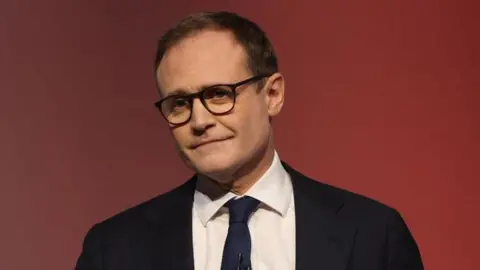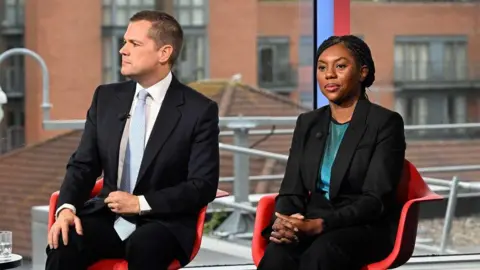What do the Tory leadership candidates offer Scotland?
 PA Media
PA MediaThe result of the contest to replace Rishi Sunak as Conservative leader will be announced on Saturday – almost four months after the election defeat that sparked his resignation.
The marathon process saw the list of candidates whittled down from six to two through a series of votes by the party's MPs.
The two remaining candidates, Kemi Badenoch and Robert Jenrick, then faced a vote of party members that ended on Thursday.
The new leader will face the challenge of bringing the party together again as it gets used to life on the opposition benches – and ultimately of attempting to overturn Labour’s huge majority at the next election.
But with much of the focus on where the two candidates stand on issues such as immigration, the economy and how the party can rebuild trust with voters, what are they offering Scotland – and what do the party’s Scottish members make of the contest?
Many Tory MSPs had backed Tom Tugendhat to be the new leader until he was knocked out of the race in fourth place.
 EPA-EFE/REX/Shutterstock
EPA-EFE/REX/ShutterstockSome Scottish Conservatives I spoke to told me he was the candidate that “got” Scotland. He had visited many times and his politics were seen as a good fit with the Scottish party.
There hasn't been the same momentum to publicly back either Badenoch or Jenrick.
Jenrick has two Scottish MPs publicly backing him - John Cooper and John Lamont - and one MSP.
Badenoch, who is seen as the frontrunner, has the support of MP Andrew Bowie and four MSPs.
One MSP told me that "the two we wanted most didn't get there", referring to Tom Tugendhat and James Cleverly who are both seen as more centrist candidates than Jenrick or Badenoch.
The Truss effect
The Scottish Conservatives have been more small ‘C’ conservatives, while the two candidates in Westminster have their eyes on fighting Nigel Farage’s Reform.
That could cause issues for newly-elected Scottish Conservative leader Russell Findlay, who has said he won't be publicly backing either but would work with whoever wins.
Both candidates have been on visits to Scotland and virtual calls with MSPs, although I was told one Jenrick call was poorly attended.
From Conservatives I’ve spoken to say there is chatter of a slight groundswell towards Kemi Badenoch within the MSP group.
It is interesting that so many MSPs are keeping their vote private. There seems to be a worry from some about potentially backing a candidate who goes on to be unpopular, which was described to me as “the Truss effect”.
An MP said the MSP group was “burned out” by the Scottish leadership election, while another said the UK leadership race didn't matter as much, because the UK leader would be irrelevant in the run up to the 2026 Holyrood elections. Ouch.
When Jenrick sat down for an interview with me, he ruled out giving further powers to the Scottish government and said he would take the UK out of the European Convention on Human Rights without consent from the Scottish Parliament.
He said it was a reserved matter and for Westminster to decide alone.
That is disputed, with three different experts on the constitution telling me they thought consent should be sought, and a senior Scottish Conservative warning that it would be “opening up a can of worms”.
The Scottish government has said it would "firmly oppose any attempt to leave" the convention.
Anyone feeling nostalgic for arguments over the constitution?
Jenrick also said there would be no special exemptions for Scotland from his ambition to legally reduce immigration in the UK to the tens of thousands, a long-held Conservative ambition that has proved very difficult to achieve by multiple prime ministers.
But he did say there could be specific schemes for some areas where there was a shortage of skills, for instance fishing.
He believes the same feelings in England around immigration apply to Scotland and therefore it needed the same remedies.

What of Kemi Badenoch? In an interview with my colleague Martin Geissler, she said immigration powers shouldn’t be devolved to Scotland as a separate Scottish visa system would be "extremely difficult" to police.
She did, however, admit there was a problem in Scotland with it “not necessarily getting the skills it needs or wants”.
Her solution to that was more training and more internal migration from other parts of the UK to Scotland.
Badenoch also said the United Kingdom union was voluntary, but failed to articulate the mechanism for Scotland to leave if voters wanted to.
'It's just more politicians'
During her speech to the Conservative conference, Badenoch talked about a "new blueprint" for the UK including a plan that looked at devolution along with a long list of other aspects of the British state.
Speaking to BBC Scotland News, she said devolution under her would focus on people and not process, saying it should bring power closer to people - for instance at local council level.
She criticised devolution in Scotland, Wales and in mayoral cities saying “it’s just more politicians” and that “devolution wasn't just about having more politicians, it was about having better policies that delivered better outcomes".
She also said "there's no point devolving if you don’t get the very best people making the decisions".
Despite her rhetoric, Badenoch admitted she didn’t have a plan ready to fix the issues she talked about, saying she would instead do that work once opposition leader.
That is a clear difference in strategy to Jenrick.
Throughout her bid to become leader, she’s been keen to talk about her credentials in fighting the SNP, using her experience as Minister of Equalities and her opposition to the Scottish government’s plans to change gender laws.
Ultimately the plans were halted after the UK government used veto powers to block the Gender Recognition Reform Bill from becoming law, with its stance being backed by the Court of Session.
Both candidates have criticised net zero targets and the timeline of moving away from oil and gas towards renewable energy and the impact on jobs.
As the contest draws to a close, it's interesting that both teams seem to think it is closer than the polls are predicting – which at the moment put Badenoch ahead - and there are worries about voter turnout being low.
It might not be that surprising, given the party membership has been used to voting for prime ministers rather than opposition leaders.
